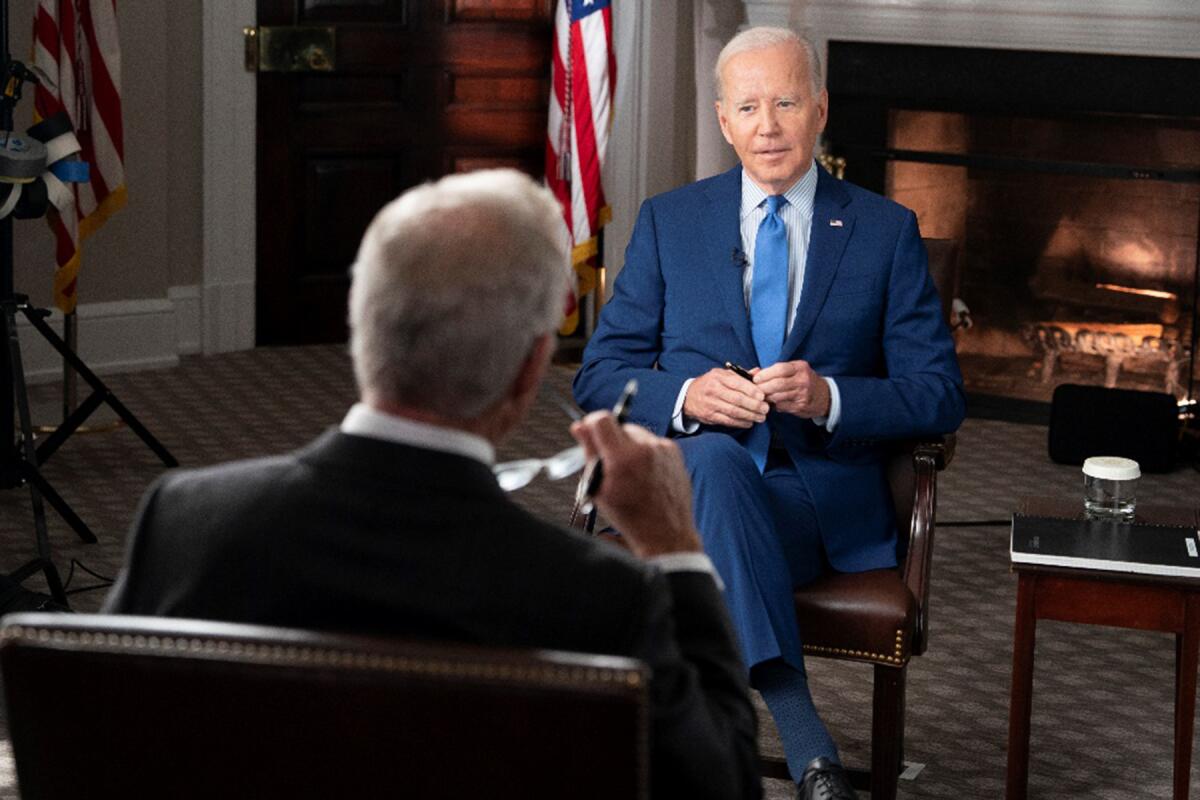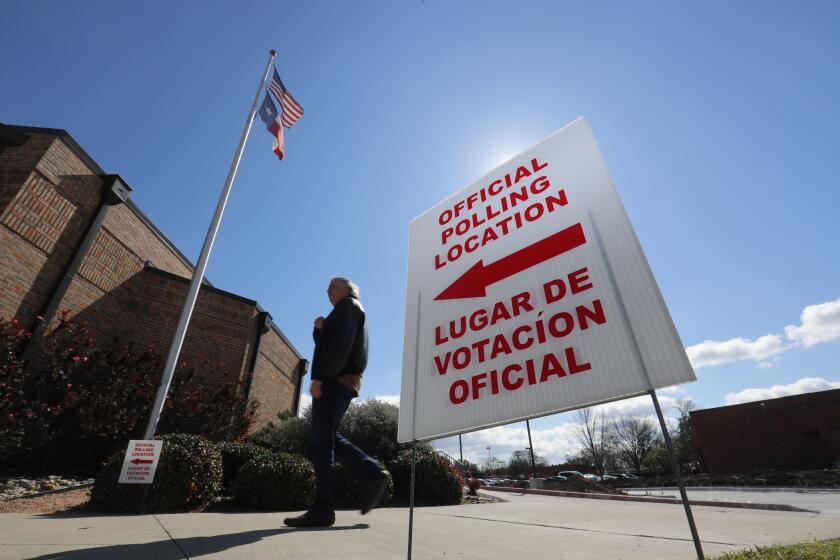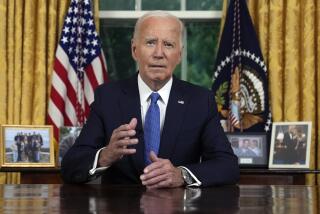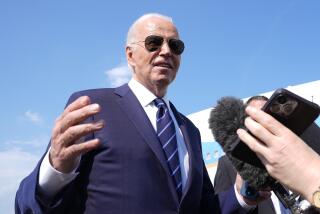Biden sent the wrong message on COVID. He can still fix it

- Share via
WASHINGTON — “The pandemic is over,” President Biden declared last week as he toured the Detroit Auto Show. “We still have a problem with COVID. We’re still doing a lot of work on it. But the pandemic is over.”
“No one’s wearing masks,” he added, gesturing toward the convention center crowd. “Everybody seems to be in pretty good shape.”
But the COVID epidemic isn’t over. It has arguably lost its status as a disease that was utterly beyond control. But it’s still causing more than 400 deaths a day, roughly three times as many as a bad season of influenza. New variants are still emerging; a wave of infections this winter could turn Biden’s optimistic claim to ashes; and long COVID, a debilitating chronic condition, affects an estimated 16 million Americans.
The possibility of a shift of Latino voters to the GOP appeals to a triumphalist streak among Republicans, an apocalyptic streak among Democrats and a hyperbolic streak in the media.
“We are not where we need to be if we are going to, quote, ‘live with the virus,’” Dr. Anthony Fauci, Biden’s chief medical advisor, said a day after the president’s statement was broadcast on CBS’ “60 Minutes.” The number of COVID deaths, Fauci said, is still “unacceptably high.”
Biden has a long history of gaffes, statements that misfire or land badly. Most are inconsequential. This wasn’t.
The president’s statement was bad on two levels, public health and politics.
First, public health. For months, Biden and his aides have struggled to persuade Americans to get vaccinated against COVID — and to get boosters, especially if they are 60 or older. The results have been disappointing: Less than half the eligible population has accepted even a single booster. This month, the government rolled out a third booster, optimized for new COVID variants, but fewer than 2% of eligible patients showed up.
“I wish he hadn’t said it,” Dr. Robert Wachter, chair of the department of medicine at UC San Francisco, said of Biden’s statement. “It’s not helpful at a time when we’re still trying to get people vaccinated.”
Public health officials are already swapping reports of people who heard Biden’s statement and decided to forgo another vaccination.
“We’re already hearing pushback: ‘If it’s over, why do I need a booster?’” said Dr. Michael Osterholm of the University of Minnesota. “I get it; the country’s done with the virus. The problem is the virus isn’t done with us.”
Biden’s aides spent much of last week trying to explain. “Look at his whole statement,” White House Chief of Staff Ron Klain said. “The sentence after ‘the pandemic is over’ is ‘we have a lot of work to do.’”
But that nuance was lost in Biden’s upbeat delivery, which sounded like a claim of victory. That’s why Klain was still explaining a week later.
Almost as bad was the political impact. Republicans in Congress crowed that if Biden believes the pandemic has waned, there’s no reason they should vote for more COVID spending.
Biden and his aides have asked Congress for $22.5 billion to pay for vaccines, testing and therapeutic drugs. The request was already stalled in the Senate; the president’s statement made its prospects even dimmer.
Why would Biden say something that landed him in that much trouble?
Joe Biden loves to be the bearer of good news, especially with an election approaching. (No politician likes to be the bearer of bad news with an election approaching.)
He’d undoubtedly like voters to remember that it was under his watch that the pandemic ended — or at least diminished enough that they could throw their irksome masks away.
It wasn’t his only excursion into unwarranted optimism; only two weeks ago he argued that inflation had been tamed when it appears to have plateaued at an 8.3% annual rate.
To be fair, though, Biden has often veered into cockeyed optimism whether an election was near or not.
He declared victory over COVID once before, on July 4, 2021, when he said vaccines would soon deliver an “Independence Day” from the pandemic. That turned out to be a “mission accomplished” moment after variants of the virus caused breakthrough infections among the vaccinated.
In 2019, when Biden began his run for president, he told voters that his election would empower moderates in the Republican Party and produce a miraculous rebirth of old-fashioned bipartisanship. That hasn’t turned out well either.
Optimism can be a good trait in a president. Franklin D. Roosevelt reassured Americans that they could prevail over the Depression and World War II. Ronald Reagan made optimism a hallmark of his vote-winning conservatism.
In Biden’s case, though, overpromising has often backfired.
I once asked Biden, when he was vice president, how to recover from a gaffe. (I figured he knew how by then.) “Own it,” he said emphatically. “Own it.”
That’s what the president ought to do now to repair the damage.
“We have to continue to make the case that COVID is still a threat,” Wachter said. “We still need to encourage people to get a booster. And we need Congress and other policymakers to see ongoing funding as important, including funding for finding a new vaccine and research on long COVID.”
The president was right to celebrate the good news: Thanks to vaccines and therapeutic drugs, COVID isn’t as dangerous as it was two years ago. But without more vaccinations and more research, the disease will still cause tens of thousands of needless deaths.
Biden needs to correct his message, and he shouldn’t wait for the midterm election to do it.
More to Read
Get the L.A. Times Politics newsletter
Deeply reported insights into legislation, politics and policy from Sacramento, Washington and beyond. In your inbox twice per week.
You may occasionally receive promotional content from the Los Angeles Times.












